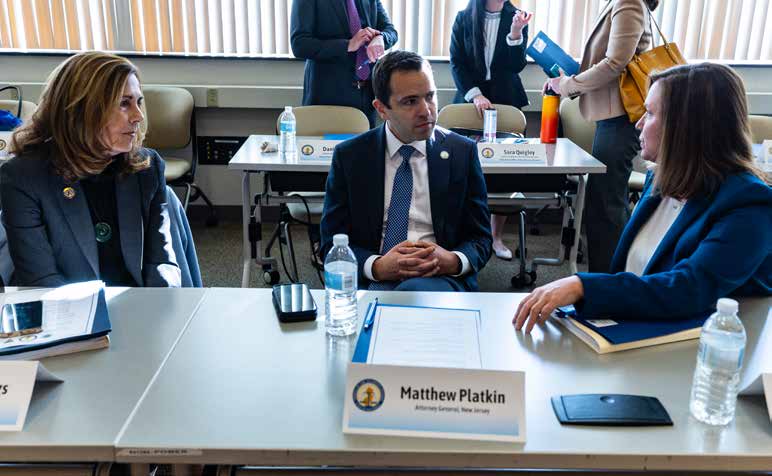
New Jersey is at the forefront of the national fight to end gun violence. Our holistic approach uses criminal, civil, and regulatory tools to reduce the number of people killed and shot, all with the goal of making our communities safer and preventing families from losing loved ones. We focus on pursuing criminals who violate our gun laws, keeping guns out of the hands of those seeking to harm others, and breaking cycles of violence.
Stopping Criminals and the Firearms They Use
Shooting victims reach record low thanks to holistic approach to public safety. For the first time since 2009, the year New Jersey began tracking the number of shooting victims, the number of people shot in New Jersey fell below 1,000 people. In 2023, 924 individuals were shot in New Jersey, down 13% from the previous year, which was itself a 25 percent reduction over 2021. Of the 924, 191 people were killed as the result of gun violence, a decrease in shooting murders of 8% from 2022. In early 2023, the New Jersey State Police (NJSP) used data and technology to identify opportunities to support local, state, and federal partners in reducing the number of shooting victims. This historic achievement was made possible through law enforcement partnerships like the Attorney General’s Gun Violence Reduction Task Force, which focuses law enforcement resources on drivers of violence, investment in violence intervention and prevention resources, and enforcement of the State’s tough gun safety laws.

The number of shooting victims decreased across the State and in many of New Jersey’s largest cities, including Trenton, Newark, Atlantic City, and Paterson. In Paterson, where the Attorney General’s Office took control of the Police Department in March 2023, the City recorded a 39 percent drop in murders and a 25 percent decrease in shooting victims compared to 2022.
Dismantling firearm pipelines and violent gangs. In one of the largest weapons seizures in recent New Jersey history, the Division of Criminal Justice (DCJ) and the NJSP Weapons Trafficking North Unit, working with our partners in New York and the U.S. Bureau of Alcohol, Tobacco, Firearms and Explosives, seized 100 guns and 200 large capacity ammunition magazines that were stolen in transit between a Vermont firearms importer and a Louisiana weapons wholesaler. In another case, 19 people were charged as part of an operation to dismantle a Perth Amboy street gang responsible for trafficking drugs and firearms and committing a series of violent crimes.
Promoting Public Safety Through Firearms Enforcement and Regulation
Defending legal tools to hold gun industry members accountable. The SAFE office, through the work of the Office of the Solicitor General, turned back a lawsuit brought by the National Shooting Sports Foundation to void P.L. 2022, c. 56, the firearms public nuisance legislation signed by Governor Murphy on July 5, 2022 that SAFE is tasked with implementing. The U.S. Court of Appeals for the Third Circuit unanimously dismissed the suit in August allowing SAFE to continue to pursue its critical mission to hold bad actors in the gun industry accountable for their actions and keep New Jerseyans safe from gun violence.
Enforcing New Jersey’s public nuisance law against gun industry members. In 2023, SAFE filed its first two lawsuits under New Jersey’s firearms public nuisance law and common law authority. The first lawsuit seeks to hold FSS Armory, a New Jersey-licensed gun dealer, accountable for improperly securing gun products and broadcasting its reckless storage practices, which led to a burglary that put those guns in the hands of traffickers and other unauthorized gun users. The second lawsuit asserts claims against Patriot Enterprises Worldwide LLC, a gun show company known more commonly as Eagle Shows, and ghost gun products vendor JSD Supply, which together have marketed gun products to New Jersey residents that can be assembled into fully functional, untraceable ghost guns.
Investing in Technology and Data Collection
Establishing microstamping standards for firearms available for commercial sale. The Attorney General’s Office has formally issued the standards and qualifying criteria that will be used to determine whether a particular microstamping-enabled
commercial firearm model should be included in the State’s microstamping roster. A microstamping-enabled firearm has unique markings imprinted on its firing pin, which are stamped onto bullet cartridge casings each time the firearm is fired.

Supporting and Protecting Crime Victims
Ensuring transparency and justice for sexual assault survivors. New Jersey received $2 million in competitive federal funding to establish an advanced tracking system for the state’s Sexual Assault Forensic Exam (SAFE) Kits, which are used to preserve physical evidence collected from medical forensic examinations conducted by qualified nurses after an individual has experienced an act of sexual violence. The grant helps to provide financial resources to ensure sexual assault survivors have the means to track the status of their SAFE Kit and related criminal proceedings. The funding will also ensure SAFE Kits are being stored and processed in a timely and transparent manner.
Making crime victim compensation applications more accessible and user friendly. The Division of Violence Intervention and Victim Assistance (VIVA) launched a new online case processing system that will increase and improve access to the critical support the Victims of Crime Compensation Office (VCCO) provides victims of crime. The updates to the existing case processing system create a more user-friendly experience for applicants filing from both desktop and mobile devices. Users can now file applications in 133 different languages and sign the applications electronically.
Strengthening New Jersey’s response to domestic violence crimes. In 2023, Attorney General Platkin issued a Law Enforcement Directive establishing the framework for a response team — known as the “Breathing/Blood Flow Restriction Event: Advocacy, Treatment, Help, and Empowerment” (BREATHE) Team — responsible for responding to crimes of nonfatal strangulation and smothering. The directive requires County Prosecutors to develop and implement procedures to refer victims of nonfatal strangulation and/or smothering for a forensic medical examination.

An additional law enforcement directive requires longer retention of evidence, including DNA evidence, from sexual assault medical examinations not processed by a lab at the survivor’s request, and extends the current required retention period from five years to 20 years. The directive also establishes statewide procedures and guidelines for tracking, storing, and determining how and when such evidence is submitted for testing, and
it limits the circumstances when law enforcement can decline to present evidence for testing in cases where a survivor has consented to it.
